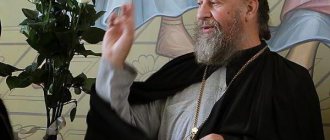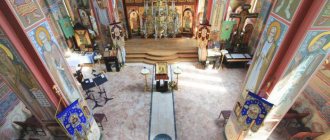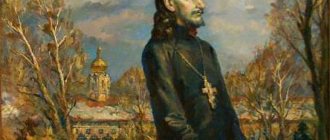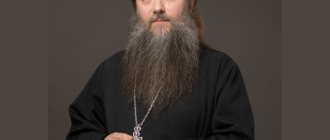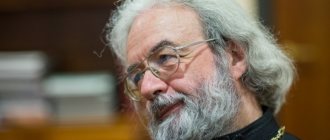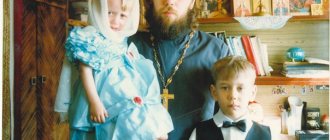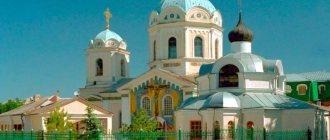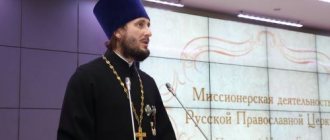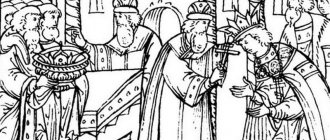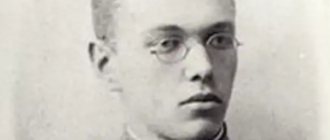Childhood and youth
Hegumen Luka (at birth - Igor Stepanov ) was born on August 4, 1966 into a Moscow intelligent family. My parents were engineers, and their work barely allowed them to live from paycheck to paycheck. Father, Ilya Stepanov , was a Leningrader; in his youth he worked as an extra at the Kirov Theater. Since childhood, he loved the theater and approved of his son’s passion for the work of a reader. But until the age of 4-5, the boy could not pronounce more than half of the letters of the alphabet, and to correct this deficiency he had to spend 2 months in the speech therapy department of the Central Clinical Hospital.
One day a boy was waiting for his mother on a date, but through the window he saw her first approaching the building and then moving away from it. Due to the quarantine, the date did not take place, and Igor was so upset by the separation that in a few days he not only corrected his speech, but also began speaking in pure Moscow dialect. At school, he participated in various reading competitions, and from the 3rd grade, in radio broadcasts of the All-Union Radio as the announcer of the “Pioneer Dawn”, and then pronounced various slogans at Komsomol congresses. Therefore, by the time I graduated from school, I could no longer imagine myself without serving on the stage.
In the middle of school, the boy went with his parents to Mongolia , where he had to study in a sports class. There he took up athletics closely and ran long distances almost until he graduated from school. This preparation was very useful later at the institute during choreography classes.
Links
- [pronskymonastery.rf/ Spaso-Preobrazhensky Pronsky Monastery]
- [vk.com/id58584590 VKontakte page]
- [www.facebook.com/igor.stepanov.900 Facebook page]
- [ruskline.ru/author/_/stepanov_luka Publications on the website of the Russian People's Line]
- [regions.ru/expert/691/ Publications on the federal information agency “Federation News”]
- [predanie.ru/luka-stepanov-igumen Luka (Stepanov) on the website of the Predanie charity foundation]
- [www.pravoslavie.ru/85824.html Luka (Stepanov) on the “Orthodoxy” website]
- [theophanica.ru/051012/16a_igumen_Luka_Stepanov.php Report by Abbot Luka (Stepanov) at section VI of Theophan's readings]
- [mediaryazan.ru/articles/detail/67341.html For a couple of affectionate ones]
- [www.eparhia-saratov.ru/Articles/article_old_8547 Hegumen Luka (Stepanov): “The issue of Orthodox education is very relevant”]
Life path
- 1983 – Having selected a good repertoire and trained with one of the excellent actors, Igor set his sights on studying at a theater university. At the same time, the applicant was so inspired that he managed to enroll immediately in Shchepka, Shchuka and GITIS, and he chose the last of these universities.
- 1985 – Since there was no military department at the institute, the student was called up for compulsory army service.
- 1987 – Demobilized and reinstated at the institute.
- 1988 - Received the rite of baptism. This happened in the Church of the Resurrection of the Word, closest to the educational institution, located on Nezhdanova Street (now Bryusov Lane). He named 4 reasons that led to this step: love for Russian classical literature, permeated with Orthodox teaching; reading the New Testament; meeting contemporaries during a trip to Poland, who turned out to be sincere believers in God; repentance for one’s own mistakes, inherent in a free-spirited and rather dissolute life due to one’s young age.
- Having graduated from GITIS with honors, he received an invitation to play leading roles in the Gogol and Ermolovsky theaters and worked on them with pleasure. However, he considered it unacceptable for himself to dance with evil spirits in the musical “Viy” based on Gogol’s mystical story or to go on any kind of tour that disgusted his soul. On the other hand, he could not, as national and honored artists, dictate the terms of a Christian to directors. Therefore, he responded to his teacher’s offer to become a teacher at his alma mater, where he taught students stage speech and acting for 3 years.
- 1994 – He graduated from the pedagogical faculty of the St. Tikhon’s Theological Institute and entered the Athos Monastery as a novice. This decision was significantly influenced by the priest who baptized him, who became the spiritual father of the future abbot.
- 1996 - He became a monk, taking the name Luke. The first place of service of the priest was the Vyshensky Assumption Monastery on the Ryazan land, with which most of his affairs would be connected in the future.
- June 25, 2001 – Elevated to the rank of hierodeacon, and 6 days later – hieromonk.
- 2002 – Received a position as head of the department of theology at Ryazan University. S. Yesenin, where he taught the disciplines “Moral Theology”, “Introduction to the Specialty”, “Dogmatic Theology” and others. At the same time, he became rector of the Church of the Intercession of the Blessed Virgin Mary and St. Tatiana.
- 2008 – Published the book “For a Tender Couple,” which was the first in a series of answers from the priest to questions from young people in spiritual quest and was republished in 2008 and 2010. He continued the series with the book “What’s not clear, dear?!”, published 2 years later and reissued in 2011. In subsequent years, 12 articles by the priest were published, dedicated to the builders of the Pronskaya Spasskaya Hermitage, the ministry of Theophan the Recluse, and the crisis of religious consciousness in the Fatherland in the year of the October Revolution.
- 2008-2012 – Worked at the Orthodox gymnasium in Ryazan as a director.
- 2011 – While organizing children’s camps, I found myself in the Pronsky Monastery for the first time, seeing the surviving buildings without domes. Together with the initiative group, he began work on its revival. At the end of the year we had to serve in unheated premises, but before the onset of severe frosts we managed to install gas heating.
- 2012 – Defended his PhD thesis in the field of historical sciences. The topic was related to the social ministry of the Russian Orthodox Church in the period from the 19th century to the beginning of the 20th.
- 2013 – Elevated to the rank of abbot and appointed rector of the newly opened Spaso-Preobrazhensky Pronsky Monastery.
- 2015 – By decree of the Metropolitan of Ryazan and Mikhailovsky, he was appointed secretary of the Diocesan Council for Theological Education.
- 2016 – In the Ryazan diocese, he was appointed deputy chairman of the church court, a member of the Diocesan Council.
- July 9, 2016 – Awarded the Order of St. Seraphim of Sarov (3rd degree).
- 2017 – Completed advanced training courses at the Russian State University. S. Yesenin on the use of information technology in the educational process.
- 2018 – Co-written with E.V. Korotkovskaya and M.A. Sokolov’s article “Spiritual verse in the system of church art.”
- 2018-2021 – He was the host of the “Soulful Supper” program on the Ryazan television and Soyuz channels. Hegumen Luka was invited to the program “Direct Line. The priest’s answer” to answer questions from viewers, and also as a guest to participate in various programs of the Spas TV channel. For example, “Conversation with an atheist”, “Let’s bring life back to the temple.”
- 2020 – Published a textbook related to the topic of my dissertation.
- 2021 – Participated in the special project “Orthodox Book Day” of the Spas TV channel.
- September 2021 – He spoke about the retraining program developed by his department at the Russian State University, where he transferred to the position of associate professor.
- October 2021 – As a member of the jury, he evaluated the participants of the XIII reading competition “Pokrovsky Evenings”, held at the Ryazan University. S. Yesenina.
- December 16, 2021 – Together with the Central Library of Ryazan, he organized a debate “Is there joy in Lent?” The meeting with college and university students was held as one of the events of the “Read, Student!” project.
Hegumen Luka Stepanov
Social activity
Despite being busy in spiritual services, Abbot Luka (Stepanov) has a busy social life. Although it would be more correct to say church and social activities. After all, all the thoughts and good deeds of Abbot Luke are aimed at enlightenment, towards strengthening the Orthodox faith in Russia. He is the author and host of the television program “Soulful Supper,” which is broadcast on the Soyuz TV channel and Ryazan television.
Hegumen Luka (Stepanov) also writes columns in Ryazan newspapers and is the author of three books on Orthodox topics, “For a couple of affectionate ones,” “The Internet is a catch...” and “What’s not clear, dear?!” His works have a question-and-answer format and are aimed at ordinary readers, i.e., lay people. They provide answers to pressing questions about pastoral life, the difficulty of choosing a life path, the influence of the Internet and social networks on the consciousness of modern man. Author's books are distributed in periodicals and online publications.
You can meet with Abbot Luka (Stepanov) not only in Ryazan, but also on the Internet. He actively participates in the All-Russian project “Father Online”, where he always and in detail answers questions from absolutely everyone.
Personal life
In his student years, having repented of his youthful frivolity, Stepanov felt that a person’s calling was to create a single family and that it was harmful to seek pleasure and entertainment outside of it. But instead of marrying the bride, he destroyed the uncreated family, devoting his life to serving Christ . The youth became his children, to whom he devotes time in various positions, including as the head of the commission in charge of issues of spiritual enlightenment and Orthodox education.
Hegumen Luka
Journalism
In addition to books, the abbot has written more than a dozen articles on the Pravoslavie.ru website. In them, he talks about fasting, shepherding, obedience and prayer, answers pressing questions of believers, and helps with good advice in overcoming any difficulties associated with a crisis of faith and overcoming fears and sinful temptations. Here, every person, regardless of age and even religion, can find useful information for themselves and understand the complexities of understanding the world around them.
Excerpt characterizing Luke (Stepanov)
The sun was just beginning to rise from behind the clouds; the air was fresh and dewy. On the way, the herd was driven out of the village. In the fields, one by one, like bubbles in water, the larks burst into life with a hooting sound. Balashev looked around him, waiting for the arrival of an officer from the village. The Russian Cossacks, the trumpeter, and the French hussars silently looked at each other from time to time. A French hussar colonel, apparently just out of bed, rode out of the village on a beautiful, well-fed gray horse, accompanied by two hussars. The officer, the soldiers and their horses wore an air of contentment and panache. This was the first time of the campaign, when the troops were still in good order, almost equal to the inspection, peaceful activity, only with a touch of smart belligerence in clothing and with a moral connotation of that fun and enterprise that always accompany the beginning of campaigns. The French colonel had difficulty holding back a yawn, but was polite and, apparently, understood the full significance of Balashev. He led him past his soldiers by the chain and said that his desire to be presented to the emperor would probably be fulfilled immediately, since the imperial apartment, as far as he knew, was not far away. They drove through the village of Rykonty, past French hussar hitching posts, sentries and soldiers saluting their colonel and curiously examining the Russian uniform, and drove out to the other side of the village. According to the colonel, the division chief was two kilometers away, who would receive Balashev and see him off to his destination. The sun had already risen and shone cheerfully on the bright greenery. They had just left the tavern on the mountain when a group of horsemen appeared from under the mountain to meet them, in front of which, on a black horse with harness shining in the sun, rode a tall man in a hat with feathers and black hair curled to the shoulders, in a red robe and with with long legs stuck out forward, like the French ride. This man galloped towards Balashev, his feathers, stones and gold braid shining and fluttering in the bright June sun. Balashev was already two horses away from the horseman galloping towards him with a solemnly theatrical face in bracelets, feathers, necklaces and gold, when Yulner, the French colonel, respectfully whispered: “Le roi de Naples.” [King of Naples.] Indeed, it was Murat, now called the King of Naples. Although it was completely incomprehensible why he was the Neapolitan king, he was called that, and he himself was convinced of this and therefore had a more solemn and important appearance than before. He was so sure that he was really the Neapolitan king that, on the eve of his departure from Naples, while he was walking with his wife through the streets of Naples, several Italians shouted to him: “Viva il re!” [Long live the king! (Italian) ] he turned to his wife with a sad smile and said: “Les malheureux, ils ne savent pas que je les quitte demain! [Unfortunate people, they do not know that I am leaving them tomorrow!] But despite the fact that he firmly believed that he was the Neapolitan king, and that he regretted the sorrow of his subjects leaving him, recently, after he was ordered to enter the service again, and especially after a meeting with Napoleon in Danzig, when the august brother-in-law told him: “Je vous ai fait Roi pour regner a maniere, mais pas a la votre,” [I made you king in order to to reign not in his own way, but in mine.] - he cheerfully set about a task familiar to him and, like a well-fed, but not fat, horse fit for service, sensing himself in the harness, began to play in the shafts and, having discharged himself as colorfully and expensively as possible, cheerful and happy, he galloped, without knowing where or why, along the roads of Poland. Seeing the Russian general, he royally and solemnly threw back his head with shoulder-length curled hair and looked questioningly at the French colonel. The Colonel respectfully conveyed to His Majesty the significance of Balashev, whose surname he could not pronounce. - De Bal macheve! - said the king (with his decisiveness overcoming the difficulty presented to the colonel), - charme de faire votre connaissance, general, [it’s very nice to meet you, general] - he added with a royally gracious gesture. As soon as the king began to speak loudly and quickly, all royal dignity instantly left him, and he, without noticing it, switched to his characteristic tone of good-natured familiarity. He put his hand on the withers of Balashev's horse. “Eh, bien, general, tout est a la guerre, a ce qu'il parait, [Well, general, things seem to be heading towards war," he said, as if regretting a circumstance about which he did not could judge. “Sire,” answered Balashev. “l'Empereur mon maitre ne desire point la guerre, et comme Votre Majeste le voit,” said Balashev, using Votre Majeste in all cases, [The Russian Emperor does not desire her, as your Majesty is pleased to see... your Majesty.] with inevitable the affectation of increasing the frequency of the title, addressing a person for whom this title is still news. Murat's face shone with stupid contentment as he listened to Monsieur de Balachoff. But royaute oblige: [the royal rank has its responsibilities:] he felt the need to talk with Alexander's envoy about state affairs, as a king and an ally. He got off his horse and, taking Balashev by the arm and moving a few steps away from the respectfully waiting retinue, began walking with him back and forth, trying to speak significantly. He mentioned that Emperor Napoleon was offended by the demands for the withdrawal of troops from Prussia, especially now that this demand had become known to everyone and when the dignity of France was insulted. Balashev said that there was nothing offensive in this demand, because... Murat interrupted him: “So you don’t think Emperor Alexander was the instigator?” - he said unexpectedly with a good-naturedly stupid smile. Balashev said why he really believed that Napoleon was the start of the war. “Eh, mon cher general,” Murat interrupted him again, “je desire de tout mon c?ur que les Empereurs s'arrangent entre eux, et que la guerre commencee malgre moi se termine le plutot possible, [Ah, dear general, I wish with all my heart that the emperors put an end to the matter between themselves and that the war, started against my will, ends as soon as possible.] - he said in the tone of the conversation of servants who want to remain good friends, despite the quarrel between the masters. And he moved on to questions about the Grand Duke, about his health and about the memories of the fun and amusing time spent with him in Naples. Then, as if suddenly remembering his royal dignity, Murat solemnly straightened up, took the same position in which he stood at the coronation, and, waving his right hand, said: “Je ne vous retiens plus, general; je souhaite le succes de vorte mission, [I will not detain you any longer, General; I wish your embassy success,] - and, fluttering with a red embroidered robe and feathers and glittering with jewelry, he went to the retinue, respectfully waiting for him.
